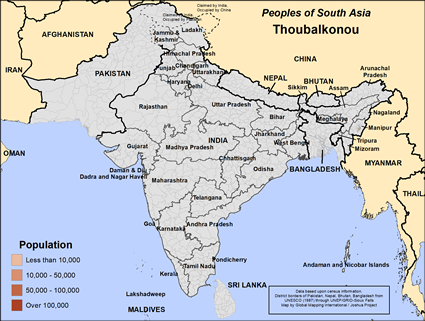Thoubalkonou in India

Send Joshua Project a photo
of this people group. |

Map Source:
People Group data: Omid. Map geography: UNESCO / GMI. Map Design: Joshua Project
|
| People Name: | Thoubalkonou |
| Country: | India |
| 10/40 Window: | Yes |
| Population: | 1,400 |
| World Population: | 1,400 |
| Primary Language: | Meitei |
| Primary Religion: | Hinduism |
| Christian Adherents: | 0.00 % |
| Evangelicals: | 0.00 % |
| Scripture: | Complete Bible |
| Ministry Resources: | Yes |
| Jesus Film: | Yes |
| Audio Recordings: | Yes |
| People Cluster: | South Asia Dalit - other |
| Affinity Bloc: | South Asian Peoples |
| Progress Level: |
|
Introduction / History
The Thoubalkonou people live in northeastern India, primarily in the state of Manipur. They have traditionally worked in agriculture, relying on the region's fertile land and favorable climate to grow crops. Over time, the Thoubalkonou have adapted to changes in the region, balancing their traditional agricultural practices with the pressures of modern economic development.
What Are Their Lives Like?
Most Thoubalkonou families depend on farming for their livelihood, cultivating rice, vegetables and other staples. The community follows seasonal farming cycles, with families working together to plant and harvest crops. Some also engage in small-scale trading and local businesses to supplement their income. The villages are tightly-knit, with extended families living close to each other and cooperating in daily tasks.
Homes are usually simple, made from locally available materials such as bamboo and mud. Daily life revolves around agricultural work, household responsibilities and community gatherings. While some members of the Thoubalkonou community have migrated to urban areas for better opportunities, the majority remain in rural areas, continuing their traditional way of life.
What Are Their Beliefs?
The Thoubalkonou people primarily practice Hinduism, observing religious festivals and rituals that align with the agricultural cycle. They celebrate major Hindu festivals such as Diwali and Holi, alongside local festivals that mark important events in the farming calendar. Temples and shrines in the villages serve as places for worship and community gatherings.
In addition to these mainstream religious practices, the Thoubalkonou people hold certain beliefs tied to nature and the land. They offer prayers and perform rituals to seek blessings for good harvests and protection from natural disasters. Religious leaders guide these practices, ensuring that they remain central to community life.
What Are Their Needs?
The Thoubalkonou people face several challenges, particularly in terms of access to healthcare, education and modern agricultural tools. Farming remains the primary occupation, but reliance on traditional methods makes the community vulnerable to environmental changes such as unpredictable rainfall or drought. Improved access to modern farming equipment and techniques would help boost crop yields and provide more stable livelihoods.
Education opportunities are limited in Thoubalkonou villages, especially for girls. This lack of access to quality schooling restricts the potential for economic mobility and development within the community. Healthcare services are similarly inadequate, with many families relying on traditional remedies or traveling long distances to reach medical facilities. Initiatives that provide access to education, healthcare and sustainable farming practices would greatly benefit the Thoubalkonou people.
Prayer Points
Pray for an abundant blessing of Thoubalkonou families and communities as they embrace Jesus Christ, the Lord of lords.
Pray for a movement to Christ that will enrich the Thoubalkonou community.
Pray for spiritual openness to Jesus Christ that will not be hindered by religious institutions rather than the person, Jesus Christ.